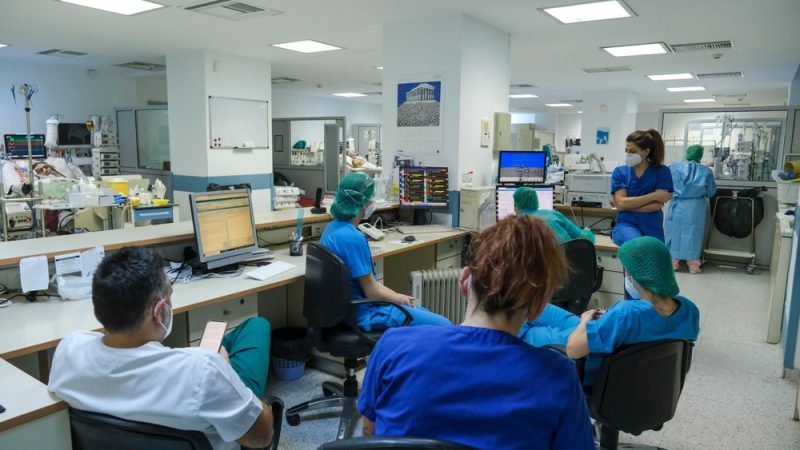Greece plans to abolish the institution of rural doctors, using young doctors as personal doctors to increase staff numbers and increase population coverage, but doctors warn of the implications, predicting a further degradation of health services. health provided to the public.
The history of the primary health care (PHC) system in Greece is complicated.
For decades, the country lacked a comprehensive strategy for primary health care services, instead placing hospital services at the center of health care. But things began to change after the financial crisis with tight funds, an aging population and rising costs making the need for an effective primary health care system more evident.
Efforts included introducing the institution of the family doctor, but nothing seemed to stick, with hospitals and private practices still preferred by most.
During the COVID years, when health took center stage, the Greek government decided to use funding from the Recovery and Resilience Fund to reshape healthcare, including the primary healthcare system. At this time, the institution of personal doctors was introduced.
However, the adoption of this initiative by doctors, mainly those working in private practice, was not what was desired. So the Health Ministry decided to take a different route to find the doctors it needed to cover the population, with one doctor registering up to 2,000 people.
The end of rural doctors
The new reform was announced at a press conference by the Deputy Minister of Health, Irène Agapidaki.
According to Agapidaki, to increase the number of pathologists and general practitioners (the two main specialties that constitute personal doctors), young doctors fresh out of medical school and before studying in the medical specialty of their choice will perform a mandatory one-year term as personal physicians. .
After that, they will benefit from economic incentives to choose the specialties of pathologists or general practitioners to further reduce the gap in the number of personal doctors in Greece.
Only 6% of medical graduates in Greece choose the specialty of pathology or general medicine, while the European average is 25%, Agapidaki said.
Non-specialized Staff Dactors
Medical associations are generally in favor of eliminating rural doctors, as their compulsory nature is seen as the main cause of the brain drain of young doctors.
But pressure from the EU to adopt a [primary health care] The system, consistent with that of other EU countries, is also flawed, the president of the Panhellenic Medical Association of Greece, Athanasios Exadaktylos, told Euractiv.
Greece has great medical wealth and must exploit it in its own way because these [external directions] do not suit us, he added, referring to the European Union’s deadlines regarding the adaptation of the personal doctors’ regime and the WHO’s advice to African countries.
It has nothing to do with us, he commented.
But it was the decision to place inexperienced doctors in highly demanding positions like PD that was met with criticism by medical associations and agencies.
This measure is part of the continued promotion of access control, [that is] strengthening the functioning of SSPs as a barrier for hospitals and doctors of other specialties, emphasized the Federation of Hospital Doctors of Greece in a press release.
Our main objection is that it is impossible for doctors who are not specialized and have just obtained a general degree to take on the same role as specialized and experienced doctors, Exadaktylos told Euractiv, adding that this cannot not offer quality service to patients when optimization of the service should be the only objective.
Economic imbalances
According to this plan, young doctors who choose to study the specialty of pathologist or general practitioner could receive an annual salary of up to 46,000 (net salary 36,000).
We fear absurd situations regarding financial rewards for first-appointed doctors compared to specialist doctors with multi-year experience and training, the president of the Panhellenic Medical Association of Greece told Euractiv.
If this project announces a total review of doctors’ salaries, then it is welcome, he added, while expressing his concerns about how economic balances between different types of doctors could be achieved.
In addition, Agapidaki also announced the implementation of a targeted repatriation program for general practitioners and pathologists from Cyprus and Great Britain.
According to the Greek Association of Hospital Doctors of Athens and Piraeus, this will undoubtedly create distortions in the income of Greek doctors, as Greek hospital doctors earn a fraction of the 150,000 annual salaries mentioned by the Deputy Minister.
We have not participated in any discussions on this topic before these announcements and we hope to have more detailed information, Athanasios Exadaktylos told Euractiv, explaining that the Panhellenic Medical Association of Greece is an agency that should legally advise the minister on these questions.
[By Marianthi Pelekakani | Edited by Vasiliki Angouridi]
Learn more with EURACTIV
#Personal #doctors #specialty #recruited #provide #Greek #primary #health #care
Image Source : www.euractiv.com

